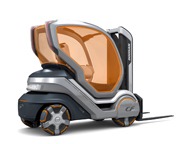For years, there have been announcements about trials of forklift trucks powered by hydrogen fuel cells. Concerns about the supply infrastructure for hydrogen fuel cells and safety questions over the refuelling process saw the early tide of forklift trials slow to a trickle. That’s no longer the case and some key fuel cell announcements have been made in the past few months – on both sides of the Atlantic.
The US has always been the most fertile ground for forklift fuel cell trials, with companies like Walmart being early adopters. But the trials have now given way to real-life applications. In February, Coca-Cola unveiled a 37-strong fleet of forklifts powered by hydrogen fuel cells at a bottling plant in California. These are designed to replace the traditional lead-acid batteries used in electric trucks and can be refuelled in minutes.
The drinks manufacturer says the new fuel technology is increasing productivity by 15%. Global consumer goods manufacturer Procter & Gamble (P&G) also plans to convert its forklift fleets at three of its US factories to hydrogen fuel cells. Once the conversation process is complete, more than 200 fuel cell forklifts will operate across the three P&G sites and the company believes the trucks will sustain power for the entire shift and be much faster to refuel, taking about two minutes to perform with high-pressure hydrogen gas.
Electric forklifts, meanwhile, continue to grow in popularity, but in the UK at least, continue to be seen as a predominantly indoor option. In some countries, notably Italy, this isn’t always the case, but it seems a likely stumbling block for future growth.
Perhaps a more likely guide to truck development can be seen in Doosan’s latest Intelligent Concept Forklift. Efficient, environmentally friendly and with the highest level of safety, the futuristic model of the Intelligent Concept Forklift has impressed onlookers with its ingenious approach to the challenges facing modern forklift manufacturing.
Doosan Industrial Vehicle (DIV) worked closely in the planning of the Concept Forklift Project with their Doosan Institute of Technology Industrial Design Team, tasking them with creating a vision of the future that incorporates new materials and production techniques, whilst sticking to the Doosan belief of simple, powerful products with great performance. The award winning technologists designed a machine they say could be produced within the next decade.
“Various elements of the design could be seen on our forklifts within five to ten years,” says Doo-yearn Jo, CTO of the Doosan Institute of Technology. “The concept allows us to consider the future possibilities of our designs in a way that is not linked to current production methods or models.”
The ICF features many innovations to enhance productivity and usability. To provide a better view of the work area, the cabin elevation and tilting function uses a hydraulic device in line with a high-torque linear motor system. The cab interior sees all steering and handling operations carried out via a multifunctional control joystick, helping to provide an intuitive, simplified user environment. Changes to the operator position, mast properties and drive train are also present.

The ICF also shows how the company may eventually incorporate augmented reality systems into a heads up display. A unique ‘work guide system’ enables operators to see information about their cargo and interpret the best optimized work process they should apply to it, helping to maximize productivity and targets. An extendable counterweight also improves stability and increases loading capacity, but maintaining the minimum turning radius.
Being electrically powered the ICF is able to reduce emissions, excess noise and fuel costs, meeting all future international environmental standards. The highly efficient rechargeable battery enables faster recharging, providing increased work time and productivity. Rapid prototyping, or 3D printing, may also prove an important element to the forklift supplier of the future. With the technology already available to reproduce complex structures by effectively printing it, the need to carry expensive parts holdings or even rarely used parts, may become less important.
“New technologies can free up the design process,” said Doosan’s Doo-yearn Jo, “as well as offer exciting new avenues that can be applied to existing products. The true arbiter will be the end user. If they want the technology, it will no doubt come to pass.”